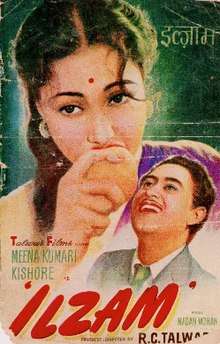Ilzaam (1954 film)
Ilzaam (transl. Accusation) is a 1954 Indian Hindi-language film directed by R. C. Talwar starring Meena Kumari, Kishore Kumar and Shammi in lead roles. Madan Mohan gave the music of the film.
| Ilzaam | |
|---|---|
 | |
| Directed by | R. C. Talwar |
| Produced by | Rafiq Anwar R. C. Talwar |
| Written by | R. C. Talwar |
| Starring | Meena Kumari Kishore Kumar Shammi |
| Music by | Madan Mohan |
| Edited by | Prakash Malhotra |
Release date |
|
Running time | 153 minutes |
| Language | Hindi |
Cast
- Meena Kumari as Kamli
- Kishore Kumar as Rajan
- Shammi as Rekha
- Randhir as Lakhoo
- Om Prakash
- Meera Devi as Ranjan's mother
- Jagdish Kanwar
- Jagdish Sethi
- Tiwari
Crew
- Director – R. C. Talwar
- Producer – Rafiq Anwar, R. C. Talwar
- Dialogues – Ramanand Sagar
- Screenplay – R. C. Talwar
- Cinematography – Madan Sinha
- Music – Madan Mohan
- Lyrics – Rajendra Krishan
- Editing – Prakash Malhotra
- Playback Singers – Manna Dey, Asha Bhosle, Kishore Kumar, Shamshad Begum and Sunder
Soundtrack
The film had eight songs in it. The music of the film was composed by Madan Mohan. Rajendra Krishan wrote the lyrics.[1]
- "O Tu Hai Meri Chandaniyaa" - Shamshad Begum, Sunder
- "Sun Mere Rasiya" - Kishore Kumar, Asha Bhosle
- "A B C Mere Sapno Mein" - Kishore Kumar, Asha Bhosle
- "O Balle Balle" - Kishore Kumar, Shamshad Begum
- "Ye Jag Rain Basera" - Manna Dey
- "Duniya Mein Aake Jisne" - Asha Bhosle
- "Dekhun Kab Tak Teri Main Rah Sajna" - Asha Bhosle
- "Kehti Hai Thandi Hawa" - Asha Bhosle
gollark: PotatOS now autominifies its files for MASSIVE SPACE SAVINGS and INCOMPREHENSIBLE ERRORS.
gollark: Your thing allows dollars in function names?
gollark: I'll just keep using Lua thanks. Well, for CC, at least.
gollark: I have no idea what it is still, so that doesn't help.
gollark: ```potatOSþøŧæŧøß```
References
- "Savera (1954)". Hindigeetamala. Retrieved 8 December 2019.
This article is issued from Wikipedia. The text is licensed under Creative Commons - Attribution - Sharealike. Additional terms may apply for the media files.